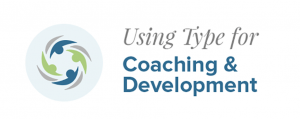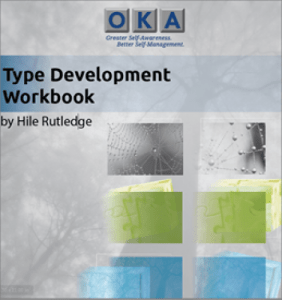What is Type Development?
Jung said that Sensing tells us that something IS, Thinking tells us WHAT it is, Feeling gives it value, and iNtuition gives it meaning. Type Development is the goal.
So much surrounding Type emphasizes the preference for one end of a dichotomy over its opposite, but Type theory is actually a holistic theory of human cognitive development that illuminates the path we each most likely follow as we experience, develop, and ultimately build toward comfort and skill with all four mental functions (S, N, T and F) at the core of Type theory. Type suggests that our preferences are hard-wired and unchanging, but our Type development—the degree to which we can access and the skill with which we use all parts of ourselves—is continually changing, and hopefully increasing.
Usually an individual or organization’s Type development—good or bad—leads to predictable outcomes and observable behaviors that can signify likely successes and challenges. It is important to note the positive—indeed essential—qualities for effective individual and organizational life that each mental function provides. The underdevelopment of a function can block us from seeing the value or even the existence of that function. A great first step in any Type development effort is to establish the existence and the value of each of the functions and their respective, unique contributions.

What are the details of iNtuition?
The iNtuitive function helps us discover all the possibilities—all the ways in which we might change the situation, our approach, or other people’s attitudes. The iNtuitive function helps us to see what is not evident and might go against our natural assumptions. With iNtuition we see patterns suggested in the whole and project them to a possible future. The iNtuitive function gives us abstraction, imagination, inference, theory, and originality.
Individuals with well-developed iNtution tend to be:
- Imaginative, future focused and visionary
- General, figurative, and big picture when they speak
- Generators—writers and/or talkers—of concepts, trends, and patterns
- Sources of new ideas and multiple courses forward
- Curious about future possibilities
Organizations with well-developed iNtuition tend to have:
- A well-defned, future-focused vision that unites the organization
- An ability to conceptualize possibilities—both good and bad—and plan for them
- A sense of the future and the possibilities within it that await cultivation
- An innovative way—or many—to project its face to the world and thrive in the marketplace
- Historical events and past performance details placed in the context of future trends and longer-term metrics
Individuals with under-developed iNtuition tend to be:
- Unimaginative
- Pessimistic with a negative or overwhelming vision of the future
- Distrustful of future possibilities
- Blind to the patterns they may find themselves in, focusing instead on individual cases, mistakes, or problems
Organizations with under-developed iNtuition tend to have:
- Stale or outdated products or services
- No unifying vision
- Tactics that are not wrapped up into a larger strategy
- A discounting or distrusting opinion of visionaries and idea-smiths within the organization—labeling them as dreamers or airheads
Next Steps:
Long a thought and training leader in Type Development, OKA offers two compelling and completely different training approaches to anyone interested in better understanding and more powerfully using Type.
 Pearman Certification introduces participants to the newest and sharpest Type tool, the Pearman Personality Integrator. This two-day class is offered in-person and online and empowers its participants to use this great new tool to support and drive focused Type Development.
Pearman Certification introduces participants to the newest and sharpest Type tool, the Pearman Personality Integrator. This two-day class is offered in-person and online and empowers its participants to use this great new tool to support and drive focused Type Development.
 Using Type for Coaching and Development is a rich and sophisticated deep dive into Type Theory, the MBTI and Type Development. In this interactive, two-day class, participants come to understand and learn how to teach and apply Type Dynamics (dominant, auxiliary, tertiary and inferior functions), balance and Type Development–even getting to practice accessing and using each of the four mental functions.
Using Type for Coaching and Development is a rich and sophisticated deep dive into Type Theory, the MBTI and Type Development. In this interactive, two-day class, participants come to understand and learn how to teach and apply Type Dynamics (dominant, auxiliary, tertiary and inferior functions), balance and Type Development–even getting to practice accessing and using each of the four mental functions.
OKA also publishes the Type Development Workbook, by Hile Rutledge to support the deep dive into Type Dynamics and Type Development.
Consider these related OKA Type Development blog titles
- OKA’s Type Development Series–#1: The Value of Thinking
- OKA’s Type Development Series–Developing T
- OKA’s Type Development Series–#2: The Logic of Feeling
- OKA’s Type Development Series–Developing Feeling
- OKA’s Type Development Series–#3: The Possibilities of Sensing
- OKA’s Type Development Series–Developing S
- OKA’s Type Development Series–Developing N


This is a great set of posts. I especially like the part about organizations. And the first paragraph says it all: too much time on instrument assessment, not enough on self-assessment, and not nearly enough on self-development through type.
Hi Hile,
Have you thought about developing online courses e.g. Type Development for Professional Practitioners to reach a wider audience who can’t attend the class-room event. The cost can reduce significantly too.
Though I prefer much more class-room training, person-to-person interaction. I’ve taken a few online courses/programs this past couple of years due my location and find they can be useful.
Regards,
Cindy
Hey Cindy,
The quick answer to your great question is “yes,” OKA is doing more and more with on-line, self-guided and e-learning. While our Type Development class will be held in a traditional classroom setting, it will draw on a number of products we are developing to give the entire experience a blended learning approach—a mix of in-person and distance learning elements. The self-guided and online learning tools will be available to anyone interested in either augmenting their in-person learning experience or for the folks who—for whatever reason—cannot attend an in-person course.
OKA has partnered with Rob Toomey to bring our clients an on-line tool called the Type Verifier (https://oka-online.com/store/index.php?route=product/product&product_id=117), and we are developing this Spring an on-line Type Development tool that allows participants to take a deep dive into their types, discover (or confirm) their type dynamics and derive a tailored and action plan to develop their types more completely. We hope to have this self-directed, on-line tool ready by late Summer of this year. OKA is also hard at work developing on-line EQ tools as well. We have an on-line EQ Tutorial and are now in development of an EQ Skill Builder.
We are pushing to have these self-guided, on-line options have the same sharp and engaging quality that has been OKA’s watermark for years. It’s great to have you come to OKA for in-person experiential training, but when you can’t (or even if you can and you want to stay engage with the content after the event), blended and on-line learning options are a must. I’m glad you asked the question, and I hope you find our e-learning options (those currently available and those soon to be released) a helpful part of your ongoing learning and development.
Thanks for the great question, and keep in touch,
Hile